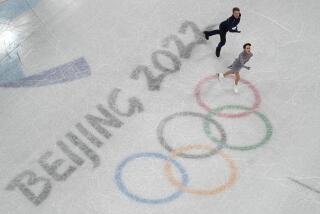U.S. wins gold at International Math Olympiad for first time since 1994
- Share via
For some, China’s dominance at the International Mathematical Olympiad seemed to confirm an unfortunate fact: Chinese students had gained an insurmountable upper hand over their American counterparts in math and science.
But this month, the world’s toughest mathematical tournament between top-ranked high school students yielded an unexpected outcome.
For the first time in more than two decades, a six-member team representing the United States won the 56th International Mathematical Olympiad, finishing with a total score of 185 to edge out China with a four-point lead. The United States last took the gold medal in 1994.
“What I’ll say is that we were definitely not expecting to win,” said Professor Po-Shen Loh, head coach for the U.S. Olympiad team. “You’re going up against a country that is four times the size, and I think that alone makes it quite a tough task.”
Over three decades, China has won the math Olympiad 19 times. Since 2006, the country had victories in seven out of nine competitions, with one loss each to Russia and South Korea. But after a series of second- and third-place finishes, Loh said, the U.S. team was ready to reclaim first place. “We’ve always been so close,” said Loh, a mathematics professor at Carnegie Mellon University.
David Stoner, a 17-year-old member of the U.S. team, said that he was intimidated by China, but that he thought the United States team had a shot at winning. More than 100 countries compete in the Olympiad, held this year in Chiang Mai, Thailand.
“We were definitely aware of our strong, strong competitors, but we also had a lot of confidence in ourselves,” said Stoner, a native of Aiken, S.C., who will attend Harvard in the fall.
Scores at the International Olympiad are based on the combined number of points by individual team members on six problems. Over two days, competitors answer problems that include algebra, geometry, number theory and combinators in 4 1/2-hour sessions, which Loh called “extremely challenging.”
One question, from last year’s competition, was:
Let n ≥ 2 be an integer. Consider an n x n chessboard consisting of n2 unit squares. A configuration of n rooks on this board is peaceful if every row and every column contains exactly one rook. Find the greatest positive integer k such that, for each peaceful configuration of n rooks, there is a k x k square which does not contain a rook on any of its k2 unit squares.
That question, and others like it, demand multi-page explanations of logical arguments, not just numerical answers, according to Caitlin Kizielewicz, who works in press relations at Carnegie Mellon.
But after the first day of the competition, Loh had an inkling that the U.S. team was doing well.
“Other coaches were saying that their scores were lower than expected,” Loh said. “It seemed that our students were able to deliver on a consistently high level even though it was a more challenging contest than normal.”
Stoner agreed.
“The only thing we had to worry about there were the math problems in front of us,” Stoner said, saying the atmosphere was intense but comfortable.
Final results of the competition were first shared electronically — and the American team had reloaded its webpage to see the scores. When the results came through, Loh said, a cheer erupted from the lobby of their hotel.
“In some sense, this is a cheer that has been six or seven years brewing,” Loh said. “This is an achievement that they clearly felt to the core at the moment they saw it.”
But while the six-member team, which also included Ryan Alweiss, Allen Liu, Yang Liu, Shyam Narayanan and Michael Kural, were hailed as “really smart” by their coach, Loh said that on an accelerated mathematics level, the U.S. has always had strong talent.
“At the very, very high end, the United States is actually very competitive, both as an incubator and an attractor of talent abroad,” he said.
The U.S. victory comes as reports have consistently shown that American students stand in the middle of rankings for math and science performance. According to a 2015 survey by the Pew Research Center, the most recent results from the Program for International Student Assessment, which measure skills among 15-year-olds from dozens of countries, placed the U.S. 35th in math and 27th in science, out of 64 countries.
But because of the infinite amount of resources available online, Loh said, everyone can learn math.
As proof, he looked to Ukraine, which had an equal number of boys and girls on this year’s Olympiad team. Although there were no girls on the U.S. squad, two girls ranked among the top 12 competitors in the United States, which Loh called a step in the right direction.
He also said that it was the country’s job to pitch math as a more exciting subject.
“As time goes on, we hope that more people will understand that math is much more than people thought,” he said.
Twitter: @natalieschachar
More to Read
Sign up for Essential California
The most important California stories and recommendations in your inbox every morning.
You may occasionally receive promotional content from the Los Angeles Times.













